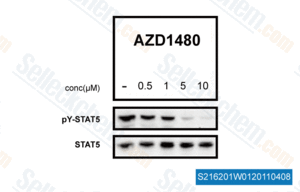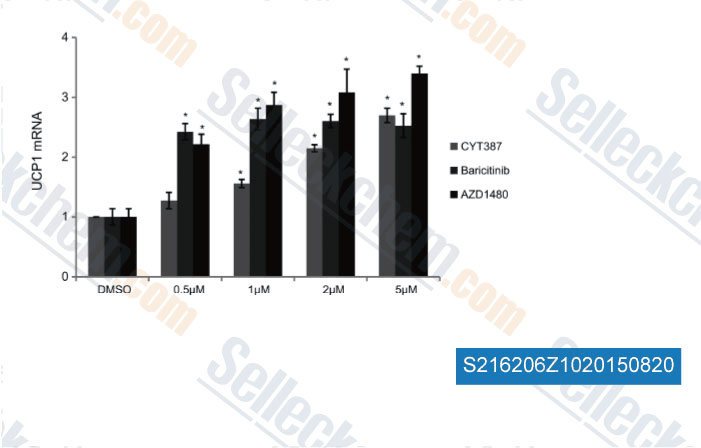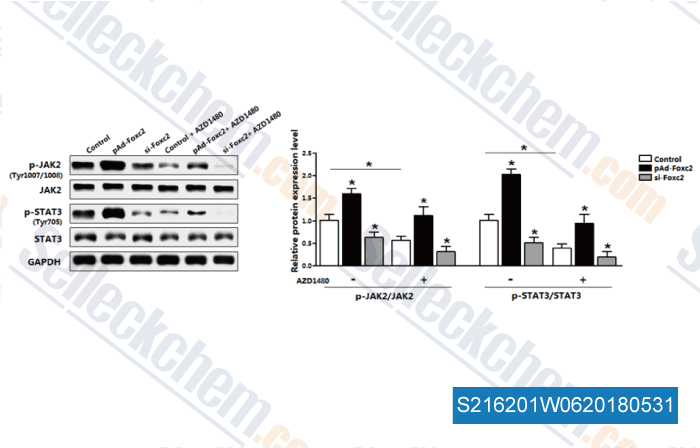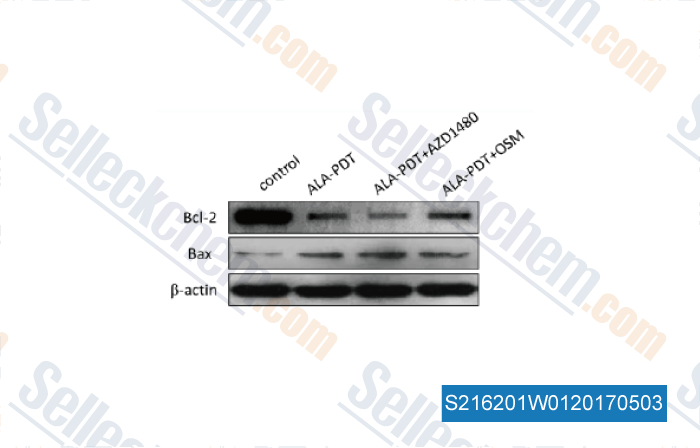|
Toll Free: (877) 796-6397 -- USA and Canada only -- |
Fax: +1-832-582-8590 Orders: +1-832-582-8158 |
Tech Support: +1-832-582-8158 Ext:3 Please provide your Order Number in the email. |
Technical Data
| Formula | C14H14ClFN8 |
|||
| Molecular Weight | 348.77 | CAS No. | 935666-88-9 | |
| Solubility (25°C)* | In vitro | DMSO | 70 mg/mL (200.7 mM) | |
| Water | Insoluble | |||
| Ethanol | Insoluble | |||
|
* <1 mg/ml means slightly soluble or insoluble. * Please note that Selleck tests the solubility of all compounds in-house, and the actual solubility may differ slightly from published values. This is normal and is due to slight batch-to-batch variations. * Room temperature shipping (Stability testing shows this product can be shipped without any cooling measures.) |
||||
Preparing Stock Solutions
Biological Activity
| Description | AZD1480 is a novel ATP-competitive JAK2 inhibitor with IC50 of 0.26 nM in a cell-free assay, selectivity against JAK3 and Tyk2, and to a smaller extent against JAK1. Phase 1. | ||
|---|---|---|---|
| Targets |
|
||
| In vitro | 5μM AZD1480 induces G2/M arrest and cell death by inhibiting Aurora kinases. [1] AZD1480 is a potent JAK2 inhibitor that can suppress growth, survival, as well as FGFR3 and STAT3 signaling and downstream targets including Cyclin D2 in human multiple myeloma cells. At low micromolar concentrations, AZD1480 blocks cell proliferation and induces apoptosis of myeloma cell lines. [2]AZD1480 effectively blocks constitutive and stimulus-induced JAK1, JAK2, and STAT-3 phosphorylation in both human and murine glioma cells, and leads to a decrease in cell proliferation and induction of apoptosis. [3]AZD1480 is a potent, competitive small-molecule inhibitor of JAK1/2 kinase, and that it is capable of inhibiting STAT3 phosphorylation and tumor growth in a STAT3-dependent manner. AZD1480 inhibits tumor angiogenesis and metastasis in part by affecting the tumor microenvironment. [4] | ||
| In vivo | AZD1480 inhibits the STAT3 phosphorylation in an xenograft model of human solid tumors and multiple myeloma. [1] In vivo, AZD1480 inhibits the growth of subcutaneous tumors and increases survival of mice bearing intracranial glioblastoma (GBM) tumors by inhibiting STAT-3 activity, indicating that pharmacologic inhibition of the JAK/STAT-3 pathway by AZD1480 should be considered for study in the treatment of patients with GBM tumors. [3]AZD1480 blocks lung infiltration of myeloid cells and formation of pulmonary metastases in both mouse syngeneic experimental and spontaneous metastatic models. Furthermore, AZD1480 reduces angiogenesis and metastasis in a human xenograft tumor model. [4] The Jak2 inhibitor, AZD1480, suppresses the growth of human solid tumor xenografts harboring persistent Stat3 activity. [5] |
Protocol (from reference)
| Kinase Assay:[5] |
|
|---|---|
| Cell Assay:[4] |
|
| Animal Study:[4] |
|
References
Customer Product Validation

-
, , M.Sc. Karoline Gaebler and Dr. Claude Haan of Université du Luxembour

-
Data from [Data independently produced by , , Nat Cell Biol, 2015, 17(1): 57-67]

-
Data from [Data independently produced by , , Int J Obes, 2018, 42(2):252-259]

-
Data from [Data independently produced by , , Photodiagnosis Photodyn Ther, 2016, 14:119-27]
Selleck's AZD1480 has been cited by 118 publications
| A panel of janus kinase inhibitors identified with anti-inflammatory effects protect mice from lethal influenza virus infection [ Antimicrob Agents Chemother, 2024, 68(4):e0135023.] | PubMed: 38470034 |
| Pacritinib inhibits proliferation of primary effusion lymphoma cells and production of viral interleukin-6 induced cytokines [ Sci Rep, 2024, 14(1):4125] | PubMed: 38374336 |
| Targeting FLT3-TAZ signaling to suppress drug resistance in blast phase chronic myeloid leukemia [ Mol Cancer, 2023, 10.1186/s12943-023-01837-4] | PubMed: 37932786 |
| JAK-STAT Signaling in Inflammatory Breast Cancer Enables Chemotherapy-Resistant Cell States [ Cancer Res, 2023, 83(2):264-284] | PubMed: 36409824 |
| Synergism of Carbamoylated Erythropoietin and Insulin-like Growth Factor-1 in Immediate Early Gene Expression [ Life (Basel), 2023, 13(9)1826] | PubMed: 37763230 |
| Integrative analysis of drug response and clinical outcome in acute myeloid leukemia [ Cancer Cell, 2022, S1535-6108(22)00312-9] | PubMed: 35868306 |
| Pathological α-synuclein recruits LRRK2 expressing pro-inflammatory monocytes to the brain [ Mol Neurodegener, 2022, 17(1):7] | PubMed: 35012605 |
| Etomidate elicits anti-tumor capacity by disrupting the JAK2/STAT3 signaling pathway in hepatocellular carcinoma [ Cancer Lett, 2022, S0304-3835(22)00457-8] | PubMed: 36265652 |
| AKTIP loss is enriched in ERα-positive breast cancer for tumorigenesis and confers endocrine resistance [ Cell Rep, 2022, 41(11):111821] | PubMed: 36516775 |
| IRF7 expression correlates with HIV latency reversal upon specific blockade of immune activation [ Front Immunol, 2022, 13:1001068] | PubMed: 36131914 |
RETURN POLICY
Selleck Chemical’s Unconditional Return Policy ensures a smooth online shopping experience for our customers. If you are in any way unsatisfied with your purchase, you may return any item(s) within 7 days of receiving it. In the event of product quality issues, either protocol related or product related problems, you may return any item(s) within 365 days from the original purchase date. Please follow the instructions below when returning products.
SHIPPING AND STORAGE
Selleck products are transported at room temperature. If you receive the product at room temperature, please rest assured, the Selleck Quality Inspection Department has conducted experiments to verify that the normal temperature placement of one month will not affect the biological activity of powder products. After collecting, please store the product according to the requirements described in the datasheet. Most Selleck products are stable under the recommended conditions.
NOT FOR HUMAN, VETERINARY DIAGNOSTIC OR THERAPEUTIC USE.
